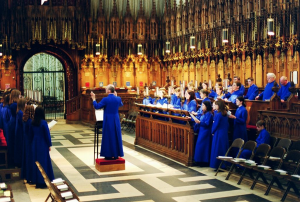
 hings have been quite hectic for the last couple of weeks, leading to my missing my scheduled post last week. Apologies all around. This week I would briefly like to focus on a brief prayer that my choir prays prior to each rehearsal and Mass. It is the RSCM Choristers’ Prayer, and I learned it while working with Charles Cole at the 2011 CMAA Colloquium in Pittsburgh:
hings have been quite hectic for the last couple of weeks, leading to my missing my scheduled post last week. Apologies all around. This week I would briefly like to focus on a brief prayer that my choir prays prior to each rehearsal and Mass. It is the RSCM Choristers’ Prayer, and I learned it while working with Charles Cole at the 2011 CMAA Colloquium in Pittsburgh:
Bless, O Lord, us Thy servants who minister in Thy temple. Grant that what we sing with our lips, we may believe in our hearts, and what we believe in our hearts, we may show forth in our lives. Through Jesus Christ our Lord, Amen.
According to the site linked above, the prayer has been almost unchanged since its origins as a blessing for cantors from the Fourth Council of Carthage (ca. 398). What I find particularly interesting about this prayer, though, is its simple articulation of an important concept in liturgical theology: lex orandi, lex credendi.
Lex orandi, lex credendi is a mnemonic for the idea that “the law of prayer is the law of belief.” Our liturgical prayer, in form and execution, bears heavily on our faith. This is why careful ars celebrandi (i.e., the style and reverence of sacramental celebration) is to be fostered. Irreverent treatment of the matters of liturgy will, over time, damage the faithful’s understanding and attitude toward sacred matter. As one of my graduate professors, Leo Nestor, used to say of careless and vapid musical choices: “That kind of music will rot your teeth and erode your faith.”
Likewise, a reverent ars celebrandi fosters a more healthy faith. When serious things are treated seriously by the priest, servers, choir, and other ministers, it has an influence on the way those things are treated by the faithful. What I also love about this prayer is continuation into the next part of the traditional principle: lex orandi, lex credendi, lex vivendi. Our law of prayer forms our law of belief, which forms our lives. Remember that the liturgy is not educational, but it is formative, so serious celebration and good musical choices will assist in the forming of the very lives of the faithful.
Again, as Dr. Nestor used to say, “Always be careful what words you put into the mouths of the people of God.” We should take that advice seriously.
